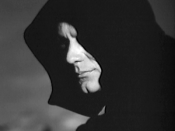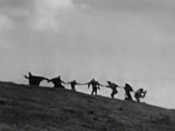The Seventh Seal: A Cinematic Masterpiece What could make up a great movie? The Direction, Effects, Plot, and the fact that it can take your mind away to so many other places, you get lost in the world of the director. Director Ingmar Bergman does just that, and creates a cinematic masterpiece that will stay with you wherever you go. There is no film that blends religion, philosophy, style, and plot greater than The Seventh Seal, a film set in the medieval times during the black plague.
The director of The Seventh Seal, Ingmar Bergman, was born on July 14th, 1918, in Uppsala, Sweden. Two years after he was born, Bergman and his family moved to Stockholm. Bergman attended Stockholm University for two years between 1938-1940, and set out to be in the theater business, and ended up directing over 40 feature films, and directing over 70 major theater productions such as Macbeth, Who's Afraid of Virginia Wolf, and Don Juan.
In most of Bergman's work, he loves to create a complex shadow behind the character that owns that scene. This technique is found several times in The Seventh Seal, such as when Antonious is speaking, in dramatic irony, to Death in a confession booth. The light creates a shadow behind Antonious of the confession window he is speaking through, and makes a visually stunning effect. This trait also shows when Death takes the life of Jons, as Death and his scythe form a stunning shadow. Another trait of Bergman's is to combine black and white film with color film, which can be found in one of his latest films, In the Presence of a Clown.
The Seventh Seal is a film that, like a lot of Berman's films, expresses the director's own philosophical and religious ideas. "All of Bergman's mature films, except the comedies, are about his discontent with the ways that God has chosen to reveal himself," (The Great Movies). In the film, Antonious Block, a knight of the crusades, searches for answers of god's existence. After returning from battle to see his family, Blocks character, (played by Max Von Sydow), is approached by Death himself, and tells him, "I have been at your side for quite some time." Since Block has seen art of Death, he has seen him portrayed playing chess. Block challenges Death to one game of chess, which will determine if he lives, or he dies. During the span of one day, Block searches for answers; he goes to confession at church, only to find he has been tricked and misled by Death; meets a lovely family with a new born son Mikal, who's parented by Jof and Mia, two actors. Death has much business to take care of, so the game must continue through periods of the day, as it finally ends in the evening.
The scene I chose was the last scene of the film, where the whole main cast is confronted by Death. The scene has three times where Berman's "shadows" are used. When Death is walking down the stairs to the lower dining room, his shadow is depicted on the wall: the shape of the shadow lets us know who it is. It happens about a minute later also, where death is standing right in from of Mia, and his trapezoid shadow reflects off the ground and wall, we know now that he owns this scene. While Death is staring the cast in the face, Block is in the back-round, but in focus, while he is praying, which reveals he has some belief in a higher being. This shot is amazing: the light is coming through the back window and lighting up Antonius Blocks face! He has a god-like shadow shining right onto himself. There are long takes in this scene, but also short takes, just like in other scenes. Many edits cut to a close-up on Mia's face, to show that she is fearful of Death, as she asks to have mercy, then she later replies, "This is the endâ¦" where the music goes totally blank. The next edit cuts to Mia and Jof waking up with Mikal in a tent, as Jof walks outside. It cuts to an extreme long shot of Death, and the entire main cast, except Jof and Mia, dancing in the distance, taken off to death. But why have Mia, Jof, and Mikal not died? Bergman leaves the question as something to think about, something to ponder after the lights go on.
The Seventh Seal is nothing short of a masterpiece, directed phenomenally by Ingmar Bergman; The Seventh Seal can defiantly be put on a list of greatest movies ever made. The lighting, the plot, and the ideas presented defiantly make this one of my favorite films. It expresses how you can't run from death, and you shouldn't be afraid from it, everyone dies. Everyone should be required to watch this movie sometime early in their life, so it stays with them forever. The chess game allows the knight to delay his passing, and sets him on a quest for proof of god's existence.




